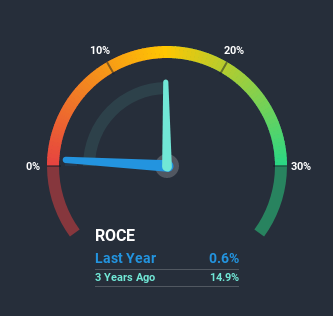Should You Be Worried About Serial System's (SGX:S69) Returns On Capital?
To avoid investing in a business that's in decline, there's a few financial metrics that can provide early indications of aging. Businesses in decline often have two underlying trends, firstly, a declining return on capital employed (ROCE) and a declining base of capital employed. Ultimately this means that the company is earning less per dollar invested and on top of that, it's shrinking its base of capital employed. So after glancing at the trends within Serial System (SGX:S69), we weren't too hopeful.
What is Return On Capital Employed (ROCE)?
If you haven't worked with ROCE before, it measures the 'return' (pre-tax profit) a company generates from capital employed in its business. The formula for this calculation on Serial System is:
Return on Capital Employed = Earnings Before Interest and Tax (EBIT) ÷ (Total Assets - Current Liabilities)
0.0058 = US$947k ÷ (US$397m - US$234m) (Based on the trailing twelve months to December 2020).
Thus, Serial System has an ROCE of 0.6%. Ultimately, that's a low return and it under-performs the Electronic industry average of 12%.
Check out our latest analysis for Serial System

Historical performance is a great place to start when researching a stock so above you can see the gauge for Serial System's ROCE against it's prior returns. If you're interested in investigating Serial System's past further, check out this free graph of past earnings, revenue and cash flow.
What Can We Tell From Serial System's ROCE Trend?
In terms of Serial System's historical ROCE movements, the trend doesn't inspire confidence. About five years ago, returns on capital were 14%, however they're now substantially lower than that as we saw above. On top of that, it's worth noting that the amount of capital employed within the business has remained relatively steady. Companies that exhibit these attributes tend to not be shrinking, but they can be mature and facing pressure on their margins from competition. If these trends continue, we wouldn't expect Serial System to turn into a multi-bagger.
On a related note, Serial System has decreased its current liabilities to 59% of total assets. So we could link some of this to the decrease in ROCE. Effectively this means their suppliers or short-term creditors are funding less of the business, which reduces some elements of risk. Since the business is basically funding more of its operations with it's own money, you could argue this has made the business less efficient at generating ROCE. Keep in mind 59% is still pretty high, so those risks are still somewhat prevalent.
The Bottom Line
All in all, the lower returns from the same amount of capital employed aren't exactly signs of a compounding machine. Investors must expect better things on the horizon though because the stock has risen 2.9% in the last five years. Either way, we aren't huge fans of the current trends and so with that we think you might find better investments elsewhere.
Serial System does have some risks, we noticed 5 warning signs (and 2 which are concerning) we think you should know about.
If you want to search for solid companies with great earnings, check out this free list of companies with good balance sheets and impressive returns on equity.
When trading Serial System or any other investment, use the platform considered by many to be the Professional's Gateway to the Worlds Market, Interactive Brokers. You get the lowest-cost* trading on stocks, options, futures, forex, bonds and funds worldwide from a single integrated account. Promoted
New: Manage All Your Stock Portfolios in One Place
We've created the ultimate portfolio companion for stock investors, and it's free.
• Connect an unlimited number of Portfolios and see your total in one currency
• Be alerted to new Warning Signs or Risks via email or mobile
• Track the Fair Value of your stocks
This article by Simply Wall St is general in nature. It does not constitute a recommendation to buy or sell any stock, and does not take account of your objectives, or your financial situation. We aim to bring you long-term focused analysis driven by fundamental data. Note that our analysis may not factor in the latest price-sensitive company announcements or qualitative material. Simply Wall St has no position in any stocks mentioned.
*Interactive Brokers Rated Lowest Cost Broker by StockBrokers.com Annual Online Review 2020
Have feedback on this article? Concerned about the content? Get in touch with us directly. Alternatively, email editorial-team (at) simplywallst.com.
About SGX:S69
Serial System
An investment holding company, engages in the distribution of electronic and electrical components, and consumer products.
Slight risk and slightly overvalued.
Market Insights
Community Narratives



